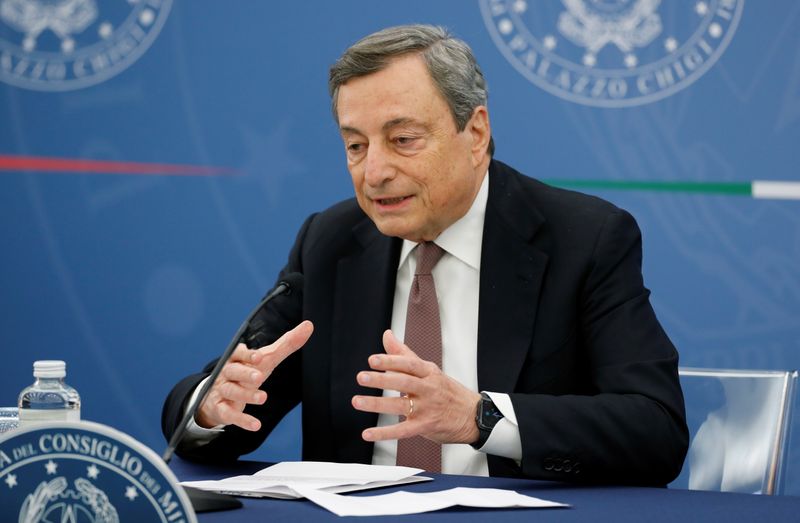By Giuseppe Fonte, Angelo Amante and Gavin Jones
ROME (Reuters) - Italian Prime Minister Mario Draghi presented his first budget on Thursday, aiming to lower the public deficit next year while cutting income and corporate tax.
Draghi, who took office in February at the head of a national unity government, said the tax reductions would amount to 12 billion euros ($14 billion), exceeding a figure of eight billion which circulated in earlier drafts of the budget.
The 2022 public deficit is targeted to fall to 5.6% of national output from 9.4% this year, reflecting strong economic growth and the end of stimulus measures introduced at the height of the COVID-19 pandemic.
"This is an expansionary budget which will help the recovery," Draghi told reporters after a 3-hour cabinet meeting that approved the package.
"We are cutting taxes, stimulating investments and improving social spending with particular attention to women and young people," he said, adding that he expected economic growth this year to be "well above" Rome's official 6% forecast.
Draghi said the projected tax cuts would amount to 40 billion euros between 2022 and 2024, helping to reduce the heavy fiscal burden placed on Italian workers.
The Organisation for Economic Cooperation and Development (OECD) estimates that in 2020 the average employee in Italy lost 46% of their gross salary in taxes and social contributions, the fifth-highest ratio out of a group of 37 advanced nations.
The new budget also increased the retirement age next year, stipulating that Italians will be able to draw a pension from the age of 64 provided they have paid in at least 38 years of contributions.
The new stopgap regime increases the retirement age by two years compared with the so-called "quota 100" system in place for the last three years, by which retirement was possible from the age of 62, with 38 years of contributions.
The issue has created tensions in Draghi's fractious coalition but the co-ruling, rightwing League party -- the main supporter of the quota 100 scheme -- said it was satisfied with the new arrangement for next year.
Draghi is continuing to negotiate with the ruling parties and trade unions over a longer-term solution.
With one of the world's oldest populations, Italy spends more than any other European country on pensions except Greece, Eurostat data shows. According to the Treasury, Rome's pension bill reached 17% of national output in 2020, an all-time record.
Draghi, whose government can only stay in office until 2023 at the latest, said he aimed to ensure that future pension pay-outs are based entirely on how much people have paid into the system.
Another thorny issue within Draghi's coalition is the so-called "citizens' income" poverty relief scheme championed by the 5-Star Movement, which Draghi said would be revised "to prevent abuses".
The government will increase checks on fraudulent claims of the welfare benefit, which will be withdrawn if a recipient refuses two job offers and gradually reduced after six months for people fit to work, Draghi said.

New taxes on plastics and sugary drinks, originally due to be applied at the start of 2020, will be delayed for a fifth time to 2023. [nL8N2RH5AL]
($1 = 0.8562 euros)